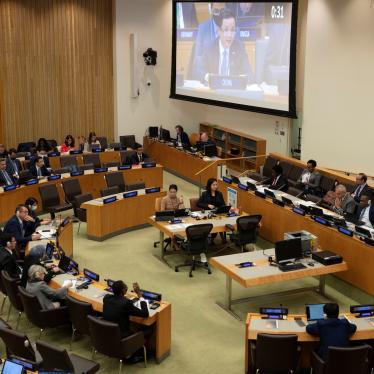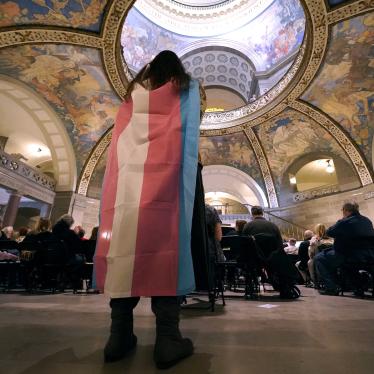We are writing to share our perspectives on the proper U.S. response to the loss of its seat on the United Nations Commission on Human Rights and to the growing influence of human rights violators on the Commission's work.
As human rights groups, we share the concern that the current makeup of the Commission will further frustrate its mission. At the same time, we believe that efforts by countries such as China, Cuba and Sudan to undermine the Commission are not a reason for the United States to walk away from the U.N., and we urge you not to condition dues payments to the U.N. on the restoration of the U.S. seat. Such a step would make it harder, not easier, for the U.S. to regain its voice on the Commission and to strengthen the Commission's own voice as a champion of human rights.
We should remember that despite its many flaws, the U.N. Commission on Human Rights has played a largely positive role in establishing the universality of basic human rights. That is why human rights violators work so hard to thwart its efforts.
For example, resolutions critical of China, one of which in 1995 came within one vote of being passed, have helped pressure Beijing to release political prisoners, to accept visits by the U.N. working group on arbitrary detention and the U.N. special rapporteur on religious intolerance, and to sign two important U.N. human rights treaties. Since 1988, strong Commission resolutions on Burma have expressed an international consensus that is impossible for that country's military regime to ignore. In 1999, a special session of the commission on the carnage in East Timor led to a call for an international inquiry and for prosecutions in Indonesian courts of those responsible. For two straight years, the Commission has condemned Russia for its abuses in Chechnya, urging that those responsible be held accountable. And this year, the Commission passed resolutions and extended mandates for U.N. special rapporteurs and representatives for countries like Afghanistan, Sudan, Iran and the Democratic Republic of Congo.
While we have not agreed with every position the United States has taken at the
Human Rights Commission, such as its votes this year against a new convention to combat political disappearances and a moratorium on the death penalty, we believe it has done much to focus the world's spotlight on the most egregious human rights abuses. We hope the United States will remain committed to that task. That does not mean accepting the status quo on the Commission, or yielding to the temptation to write it off and walk away. Instead, we hope that the United States will take the process more seriously, devoting sustained high level attention and resources to multilateral diplomacy so that votes on behalf of human rights are won, not lost. Indeed, the United States can and should remain active in the next session of the Commission even without a vote.
The problems the United States has experienced on the Commission are caused by many factors: from the "abusers solidarity" demonstrated by nations that resent U.N. interference, to the lack of solidarity among the United States and its democratic allies on key human rights issues like the International Criminal Court, and the perception that the United States takes its position and influence for granted. Nevertheless, if the U.S. campaigns in the traditional way to regain its seat, it stands an excellent chance of winning. But it would be a mistake for the United States to claim an absolute right to sit on the Commission, just as it was a mistake to assume its seat was unassailable. Nor should the U.S. threaten to withhold its U.N. dues, which it has a legal obligation to pay. Such a step would intensify the very resentment among key partners that contributed to the loss of its seat. It would accelerate the debilitating cycle of recriminations dividing the United States and its democratic partners on the Commission. Those victims of abuse around the world who look to the Commission to support their struggles would be the losers, and the abusers who seek to undermine the Commission the winners.
When abusers are uniting, defenders of human rights should not be bickering. Instead, the United States should join others from Europe, Asia, Africa and Latin America and the Middle East to strengthen the Commission. One way to start would be to insist that all candidates for membership agree to allow the U.N.'s human rights investigators free access to their territory, a condition that would naturally apply to the U.S. as well.
Recent events at the U.N. should focus attention on the need to improve global institutions dedicated to human rights, and to ensure that the United States is at the forefront of that effort - as it was in the days when it led the way in the creation of the Commission on Human Rights and of the standards it is meant to uphold. We look forward to working with you to find constructive ways to advance that goal.
Tom Malinowski
Washington Advocacy Director
Human Rights Watch
Elisa Massimino
Washington Director
Lawyers Committee for Human Rights
Stephen Rickard
Director
Robert F. Kennedy Memorial Center For Human Rights
Leonard S. Rubenstein
Executive Director
Physicians for Human Rights
Charles Brown
Deputy Executive Director
Action Mobilization
Amnesty International USA
Lynn M. Thomas
Executive Director
Minnesota Advocates for Human Rights
Gay McDougal
Executive Director
International Human Rights Law Group
cc: Senator Jesse Helms
Senator Joseph Biden






